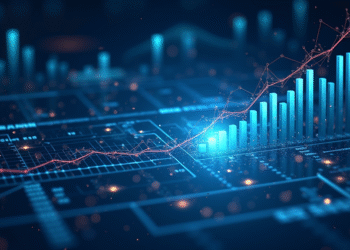May marks Mental Health Awareness Month, a time when society reflects on the growing crisis of depression and anxiety affecting millions worldwide. Amid this wave of awareness, Cybin Inc. (NYSE American: CYBN), a biotech firm specializing in psychedelic-based therapies, is emerging as a serious contender to redefine how we approach mental health treatment. In a recent interview with Tomi Lahren, Cybin CEO Doug Drysdale shed light on their clinical progress, the future of depression therapy, and why investors should take note now.
The Problem with the Status Quo
Doug Drysdale opened the conversation with a stark truth: “For the last 40 years or so, we’ve just been treating the symptoms of depression.” Traditional antidepressants, often taken daily for years, only suppress symptoms temporarily. Once the patient stops, the depression often returns. The current pharmaceutical approach, in essence, offers maintenance, not healing.
Drysdale’s mission with Cybin is to shift from this outdated symptom management model to actual disease modification, addressing the root of the problem rather than just masking it.
The Psychedelic Difference
Cybin is not playing with traditional psychedelics like LSD or magic mushrooms. Instead, they are engineering second-generation psychedelic compounds, synthetically modified to enhance safety, predictability, and therapeutic outcomes. These are delivered in controlled clinical environments where patients wear eye masks and headphones to eliminate distractions. The experience is far from a recreational trip. It is an inward journey, closely monitored by trained professionals.
More importantly, these compounds induce neuroplasticity, the brain’s ability to rewire itself and form new thought patterns. This mechanism allows patients stuck in repetitive negative thinking to break free—essentially rewiring the depressive brain.
Remarkable Results in Early Studies
What sets Cybin apart isn’t just the science—it’s the clinical outcomes. In one study highlighted by Drysdale, 75% of patients were in remission from depression after just two doses of Cybin’s compound. A year later, 71% remained in remission. Compare that to ketamine-based treatments, which typically require bi-weekly dosing, totaling 26 sessions a year. Cybin’s two-dose model is a potential revolution.
Overcoming the Psychedelic Stigma
The word “psychedelics” still raises eyebrows. Lahren pressed Drysdale on this, comparing it to party drugs or spiritual retreats like Ayahuasca trips in Costa Rica. Drysdale was quick to point out that while both may have some therapeutic overlap, Cybin’s work is clinically grounded, scalable, and FDA-guided.
“We want this to be accessible for everyone—not just for the rich who can fly to South America,” he said. That means building therapies that are prescribed by doctors, reimbursed by insurance, and regulated through formal approval channels.
Safety and Abuse Potential
One of the most impressive features of Cybin’s treatments is their built-in safety mechanism. Once a patient reaches a psychedelic state, the receptors involved internalize, making further dosing ineffective for a time. This drastically reduces the risk of abuse. Side effects observed so far are minimal and temporary, headaches, nausea, and mild blood pressure elevation during the session, but nothing long-term or life-altering.
For contrast, common antidepressants are known to cause weight gain, insomnia, sexual dysfunction, and must be taken daily for years.
FDA Support: A Regulatory Green Light
Perhaps most exciting from an investor perspective is the regulatory outlook. Cybin has already received Breakthrough Therapy Designation from the FDA. This rare status means that the agency views Cybin’s work as highly promising and offers accelerated pathways to approval, including close guidance on clinical trial design.
Drysdale noted strong institutional support from public health leaders including the Secretary of Health and Human Services, FDA officials, and even figures like RFK Jr. who have publicly backed the promise of psychedelics for mental health.
No Pushback from Big Pharma
Surprisingly, Drysdale says Cybin hasn’t yet faced resistance from pharmaceutical giants. Unlike cannabis-based treatments, which involve multiple hard-to-standardize compounds, Cybin’s engineered psychedelics are single-molecule drugs, easier to control and bring through regulatory frameworks.
And because most existing antidepressants are now generic or off-patent, big pharma may actually see an opportunity in partnering with or acquiring companies like Cybin rather than trying to suppress them.
From Outlier to Mainstream: A Tipping Point
Psychedelics are no longer fringe science. With millions still suffering despite traditional treatments, the need for alternatives is urgent and the data is finally catching up with the promise.
From a business and investor standpoint, Cybin has laid the groundwork for a multi-billion-dollar market opportunity in psychedelic therapeutics. With robust clinical results, FDA fast-tracking, and minimal side effects, Cybin is one of the few players poised to go the distance.
Drysdale closed the interview with a powerful observation: patients often describe their experience with Cybin’s treatment as “one of the most profound moments of their life.” If that level of impact can be scaled and regulated, it’s not just a therapeutic breakthrough, it’s an investment thesis.
This article is for informational purposes only and does not constitute financial, investment, or medical advice. Readers should conduct their own due diligence and consult with a qualified financial advisor before making any investment decisions. The author and/or the publishing company may hold a position in Cybin Inc. or may have other financial interests in the company mentioned.













